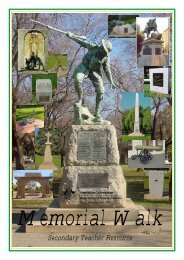The battle for Greece & Crete.pdf - Army Museum of South Australia
The battle for Greece & Crete.pdf - Army Museum of South Australia
The battle for Greece & Crete.pdf - Army Museum of South Australia
Create successful ePaper yourself
Turn your PDF publications into a flip-book with our unique Google optimized e-Paper software.
<strong>The</strong> first Military Police to land in <strong>Greece</strong> arrived as the 1 st <strong>Australia</strong>n Corps Provost Company withthe 2/3 Infantry Battalion on the 18 th and 19 th March 1941, they were to be followed by the 6 th DivisionProvost Company and the 7 th Division Provost Company and on <strong>Crete</strong> they were joined by theOrdnance Provost Section.In this campaign the Military Police certainly lived up to their Motto:“First in Last Out”<strong>The</strong>y were highly involved in the campaign from the start, taking part in the following engagements:• 14 th April at Ellison and Portas Pass• 19 th April at Larissa and <strong>The</strong>bes• 18 th - 23 rd April at town <strong>of</strong> Lamia• 24 th April at Brallos Pass• 26 th April at Megra (one <strong>of</strong> the evacuation ports)Brallos PassPart <strong>of</strong> the old Road at Brallos Pass<strong>The</strong> Corps involvement was recognised very early in the campaign with Sgt. Tom Osborne receiving aMilitary Medal (MM) <strong>for</strong> his actions at Portas Pass, with a second Military Medal being awarded toS/Sgt. Edward Trench (later promoted to Lieutenant) who un<strong>for</strong>tunately was killed on the 12 th January1943 and is buried in Port Moresby (Bomana) War Cemetery. During the actions <strong>of</strong> the 18 th to 23 rdApril at Lamia, Capt. John Grimshaw was awarded the Military Cross (MC). During the campaignother members <strong>of</strong> the Corps were also to receive five, Mentioned in Dispatches (MIDs) one <strong>of</strong> thesebeing awarded to Lt. John Hazel, (later Captain) not a bad record <strong>for</strong> a Corps who many believe weresupposed to only be working in the rear echelon ‘Checking Passes and kicking arses “.<strong>The</strong> Evacuation<strong>The</strong> evacuation <strong>of</strong> so many troops required a co-ordinated plan and strict control. This fell in part onthe Military Police, they were required to keep the roads open and flowing event though they werecontinually under attack to ensure that as many troops and as much equipment as possible reached theevacuation points which were spread over many areas <strong>of</strong> <strong>Greece</strong>.Whilst the troops withdrew it is reported that the members <strong>of</strong> 6 th Division Provost whilst rein<strong>for</strong>cingthe order that all vehicles were required to travel with dimmed lights, they carried out a veryremarkable per<strong>for</strong>mance considering the heavy traffic on the road and the evacuation was successfulentirely due to the good traffic control <strong>of</strong> the MPs.By the 19 th April the 7 th Division Provost were still ‘coolly’ directing the stragglers vehicles at Larrisaknowing that the German Advance Guard could arrive at any time.During the evacuation to Kalamata 600 vehicles containing 6000 troops were moved <strong>of</strong> 90 miles <strong>of</strong>narrow winding mountain roads to the evacuation point Brigadier Allen said:- 26 -











